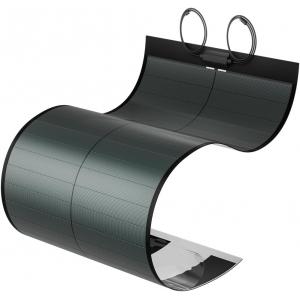
Add to Cart
100W Flexible Solar Panel
| Material | CIGS Thin-Film Solar Cell |
| Item Weight | 4.4 Pounds |
| Connector Type | Solar Connector |
| AC Adapter Current | 4.01 Amps |
| Maximum Voltage | 25V |
| Maximum Power | 100W |
| Product Dimensions | 10.83 x 10.83 x 28.74 inches |
| Manufacturer | Future Tech |
CIGS solar panel (copper indium gallium selenide solar panel) is a thin film solar cell technology composed of copper, indium, gallium, selenium and other elements. This technology has some unique advantages compared to traditional silicon-based solar panels, and its development trends and application scenarios have also attracted much attention.

First, one of the advantages of CIGS solar panels is their high efficiency and flexibility. Compared with silicon-based solar panels, CIGS solar panels can work under lower light conditions and can adapt to different angles and curved surfaces, making them more suitable for flexible and curved surface applications. This flexibility makes CIGS solar panels have broad application prospects in scenes with many curved surfaces such as buildings, cars, and ships.

Secondly, CIGS solar panels have high energy conversion efficiency. Although its conversion efficiency may be slightly lower than traditional silicon-based solar panels, technological advancements in recent years have made CIGS solar panels increasingly efficient. This technological advancement has promoted its wider application in commercial and industrial fields, especially in low-light conditions, which gives it unique advantages in subtropical areas, cloudy days or shaded locations.

In addition, CIGS solar panels have certain advantages in production technology. Its manufacturing process is relatively simple and can be made into thin, flexible films, so production costs are relatively low. Moreover, this technology allows the production of solar panels using new processes such as printing and spray coating, making the manufacturing process more flexible and scalable.

The development trend of CIGS solar panels is also constantly improving. As technology continues to improve, people's requirements for photovoltaic conversion efficiency, production cost and durability continue to increase. In recent years, scientific research institutions and solar energy companies have been working to improve the efficiency of CIGS solar panels while reducing production costs, which will further promote their competitiveness in the market.

In terms of usage scenarios, CIGS solar panels have many potential applications. Its thin and soft characteristics make it suitable for scenes with many curved surfaces such as building surfaces, vehicle shells, and mobile devices. The panels could be integrated into building materials to create solar walls, solar roof tiles, or even in applications such as smart clothing or portable solar charging devices.

In summary, CIGS solar panels have the advantages of high efficiency, flexibility, and low production costs. With continuous technological advancement, they are expected to be more widely used in construction, transportation, outdoor equipment and other fields in the future.